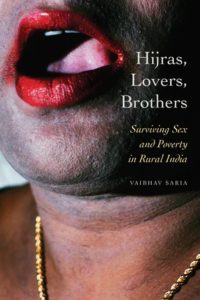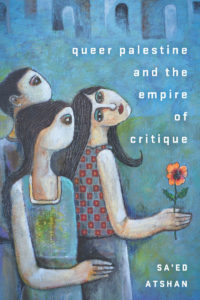The Association for Queer Anthropology (AQA) is pleased to announce the 2021 winners of the Ruth Benedict Book Prize for outstanding scholarship on a lesbian, gay, bisexual, or transgender topic. The prize is presented each year to acknowledge excellence in a scholarly book written from an anthropological perspective that engages theoretical perspectives relevant to LGBTQ studies. The Ruth Benedict Book Prize Committee considered a significant number of nominations this year, representing the range and depth of exceptional new work in queer anthropology. We are delighted to announce this year’s winners.
 In the category of Outstanding Single-Authored Monograph, the winner of the Ruth Benedict Prize is Vaibhav Saria for Hijras, Lovers, Brothers: Surviving Sex and Poverty in Rural India (Fordham University Press, 2021). The book is an impressively rich and nuanced ethnographic account of the everyday lives of hijras, what is often translated as one of India’s “trans” populations. Throughout twenty-four months of fieldwork, Saria followed hijras as they attended ceremonies, begged in trains, engaged in sex work, and spent time in their homes. Written in a graceful and generous register, the book challenges simple ideas of hijras as representing a stable gender identity or a marginal population that lives on the outskirts of heteronormative reproductive pursuits. If many hijras do indeed opt out of social demands to grow their lineages, many also continue to claim rights in family property and contribute to familial pursuits of social reproduction, in ways that generate continuous contradictions and conflicts. Central to the survival of kinship relations, hijra labor—sexual or otherwise—is more easily rendered invisible. Imaginatively foregrounding ethnographic objects of conceptual reflection — semen, money, phantom babies, and fratricidal desires, to name only a few — Saria offers new points of departure for a queer theory from the Global South, but also for a postcolonial psychoanalysis and the anthropology of kinship, gender, and sexuality.
In the category of Outstanding Single-Authored Monograph, the winner of the Ruth Benedict Prize is Vaibhav Saria for Hijras, Lovers, Brothers: Surviving Sex and Poverty in Rural India (Fordham University Press, 2021). The book is an impressively rich and nuanced ethnographic account of the everyday lives of hijras, what is often translated as one of India’s “trans” populations. Throughout twenty-four months of fieldwork, Saria followed hijras as they attended ceremonies, begged in trains, engaged in sex work, and spent time in their homes. Written in a graceful and generous register, the book challenges simple ideas of hijras as representing a stable gender identity or a marginal population that lives on the outskirts of heteronormative reproductive pursuits. If many hijras do indeed opt out of social demands to grow their lineages, many also continue to claim rights in family property and contribute to familial pursuits of social reproduction, in ways that generate continuous contradictions and conflicts. Central to the survival of kinship relations, hijra labor—sexual or otherwise—is more easily rendered invisible. Imaginatively foregrounding ethnographic objects of conceptual reflection — semen, money, phantom babies, and fratricidal desires, to name only a few — Saria offers new points of departure for a queer theory from the Global South, but also for a postcolonial psychoanalysis and the anthropology of kinship, gender, and sexuality.
 The Committee also recognizes Sa’ed Atshan’s single-authored monograph Queer Palestine and the Empire of Critique (Stanford University Press, 2020) with an Honorable Mention. This is a most timely and admirably courageous book that challenges the seeming gap between queer activism and anthropology. Atshan traces the rise of the global queer Palestinian solidarity movement from 2002 on, and explores why, since 2012, the movement plateaued — no longer growing nor receding. Drawing on longstanding conversations with queer activists in Israel/Palestine and the diaspora, the author shows how, in recent years, critiques of empire have ironically given rise to an “empire of critique”: an uneven (and often toxic) global field of debate, in which activists and academics based in the West can criticize Palestinian activists in ways that undermine their solidarity-building efforts and expand extant regimes of surveillance, suspicion, and control. An example in this regard are the so-called “radical purists” who believe that there is only one truth about any given oppressive situation and about how to practice liberation. In contrast, Atshan shows that anthropology has the potential to support local activist struggles against homophobia and imperialism by rigorously engaging with, rather than dismissing, the experiences and views of these activists—their simultaneous engagement with multiple axes of oppression.
The Committee also recognizes Sa’ed Atshan’s single-authored monograph Queer Palestine and the Empire of Critique (Stanford University Press, 2020) with an Honorable Mention. This is a most timely and admirably courageous book that challenges the seeming gap between queer activism and anthropology. Atshan traces the rise of the global queer Palestinian solidarity movement from 2002 on, and explores why, since 2012, the movement plateaued — no longer growing nor receding. Drawing on longstanding conversations with queer activists in Israel/Palestine and the diaspora, the author shows how, in recent years, critiques of empire have ironically given rise to an “empire of critique”: an uneven (and often toxic) global field of debate, in which activists and academics based in the West can criticize Palestinian activists in ways that undermine their solidarity-building efforts and expand extant regimes of surveillance, suspicion, and control. An example in this regard are the so-called “radical purists” who believe that there is only one truth about any given oppressive situation and about how to practice liberation. In contrast, Atshan shows that anthropology has the potential to support local activist struggles against homophobia and imperialism by rigorously engaging with, rather than dismissing, the experiences and views of these activists—their simultaneous engagement with multiple axes of oppression.
AQA would like to thank the Ruth Benedict Book Prize Committee for their work, including former Benedict Prize winners Amy Brainer and EJ Gonzalez-Polledo, and Graduate Student Representative Armanc Yildiz. For additional information, please contact the Committee Chair, George Paul Meiu at meiu@fas.harvard.edu.
